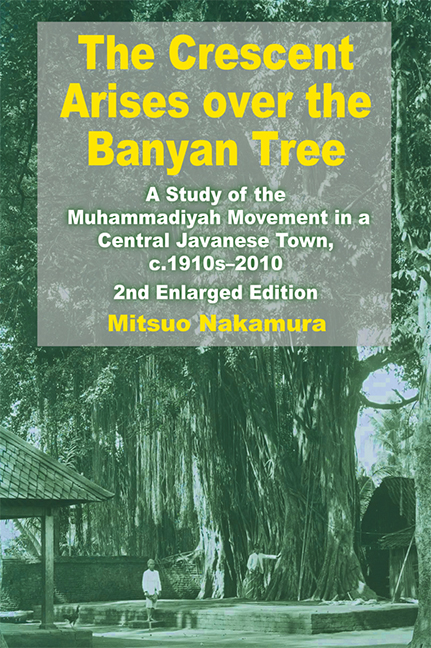 The Crescent Arises over the Banyan Tree
The Crescent Arises over the Banyan Tree Book contents
- Frontmatter
- Dedication
- Epigraph
- Contents
- List of Figures and Maps
- List of Tables
- List of Boxes
- Foreword to the Second Edition
- Preface to the Second Edition
- Foreword to the First Edition
- Preface to the First Edition
- Notes
- Map
- PART I DEVELOPMENT OF THE MUHAMMADIYAH IN KOTAGEDE, c.1910s–1972
- PART II KOTAGEDE REVISITED, 1972–2010
- Epigraph
- Map
- Introduction to Part II
- 8 Social Changes in Kotagede, 1972–2010
- 9 The Achievements of the Muhammadiyah
- 10 Internal Dynamics of the Muhammadiyah Movement
- 11 Challenges Facing the Muhammadiyah
- 12 Festival Kotagede: Conflict and Integration
- 13 The May 2006 Earthquake and Reconstruction of Kotagede
- 14 Concluding Remarks: Future of the Muhammadiyah
- Postscript to Part II
- Bibliography
- Glossary
- Appendices
- Index
- About the Author
10 - Internal Dynamics of the Muhammadiyah Movement
from PART II - KOTAGEDE REVISITED, 1972–2010
Published online by Cambridge University Press: 21 October 2015
- Frontmatter
- Dedication
- Epigraph
- Contents
- List of Figures and Maps
- List of Tables
- List of Boxes
- Foreword to the Second Edition
- Preface to the Second Edition
- Foreword to the First Edition
- Preface to the First Edition
- Notes
- Map
- PART I DEVELOPMENT OF THE MUHAMMADIYAH IN KOTAGEDE, c.1910s–1972
- PART II KOTAGEDE REVISITED, 1972–2010
- Epigraph
- Map
- Introduction to Part II
- 8 Social Changes in Kotagede, 1972–2010
- 9 The Achievements of the Muhammadiyah
- 10 Internal Dynamics of the Muhammadiyah Movement
- 11 Challenges Facing the Muhammadiyah
- 12 Festival Kotagede: Conflict and Integration
- 13 The May 2006 Earthquake and Reconstruction of Kotagede
- 14 Concluding Remarks: Future of the Muhammadiyah
- Postscript to Part II
- Bibliography
- Glossary
- Appendices
- Index
- About the Author
Summary
THREE GENERATIONS OF LEADERSHIP
Over the period of forty years (1970–2010) that I have observed on the Muhammadiyah movement in Kotagede, I have witnessed three generations of leadership emerge. The first generation was that of Haji Masjhudi (1888–1972), the “founding fathers”. They were mostly from the families of ulama, or wealthy merchants and industrialists. They were educated at traditional pesantren first but became critical of it later. They also became critical of Javanese Islam (kejawen) embodied by the Mataram Sultanate and advocated its purification and reform. They led the Muhammadiyah movement through the “tiga zaman” (three ages, i.e. the periods of Dutch, Japanese, and Independent Indonesia), 1920s to 1950s. (See Chapters 3 to 5.)
The second generation was mostly from the families of the founding fathers. Their leadership almost paralleled the presidency of General Soeharto (r.1966–98) for the nation. Typical of this second generation was Bashori Anwar (1933–2006) (Figure 10.1), who occupied the chairmanship of the Kotagede Branch of Muhammadiyah for four five-year terms from 1970 to 1990.
After a transitional zig-zagging for fifteen years from 1990 to 2005, the branch leadership of the Kotagede Muhammadiyah is now in the hands of the third generation represented by its current chairman Kaharuddin Noor (b. 1963). He is no longer from the “elite families” of the town. He is the son of a tailor well known for his skills but modest in lifestyle. His chairmanship indicates that the centre of gravity of the Muhammadiyah leadership in the town has moved to the new educated middle class. In this chapter, I shall examine these generational transitions and their implications for the local Muhammadiyah movement.
THE SECOND GENERATION OF THE MUHAMMADIYAH LEADERSHIP
Most of the members of the second generation of the Muhammadiyah leadership in Kotagede were born in the families of the Muhammadiyah founders. They were also mostly the direct products of the Muhammadiyah's “internal breeding”. In other words, they were the first products of the Muhammadiyah's educational system. Many of them went to the Muhammadiyah's local primary school, then to its teachers’ training high schools, Mu'allimin (for boys) or Mu'allimat (for girls), in Yogyakarta. After graduation, some were sent out to other areas for missionary work.
- Type
- Chapter
- Information
- The Crescent Arises over the Banyan TreeA Study of the Muhammadiyah Movement in a Central Javanese Town, c.1910s-2010 (Second Enlarged Edition), pp. 283 - 310Publisher: ISEAS–Yusof Ishak InstitutePrint publication year: 2012


